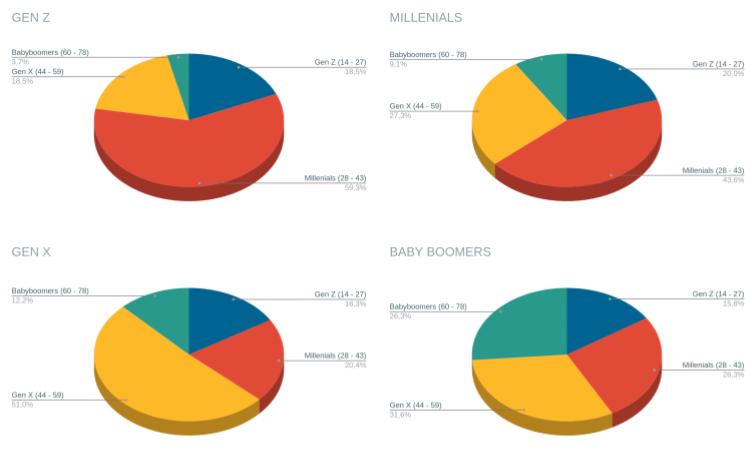46. The person who intervene to solve the situation belongs to which generation?

This question explores respondents’ perceptions about which generation typically takes action to resolve discriminatory situations in the workplace. It asks participants to identify which generational cohort most frequently intervened when discrimination occurred, based on their personal experience.
- Gen X emerges as the generation most consistently identified across all respondent groups as taking action to resolve discriminatory situations.
- There is a notable tendency for respondents to see their own generation or the one immediately above them as the most likely to intervene.
- Younger generations (Gen Z) are rarely perceived as problem-solvers by any group, likely due to their junior status and less established workplace influence.
The perception patterns suggest that organizational authority, experience, and position significantly influence who is seen as capable of effectively addressing discrimination.The data reveals an interesting dynamic where middle generations (Millennials and Gen X) are viewed as playing a bridging role in resolving intergenerational workplace conflicts.
This generational analysis of intervention patterns provides valuable insights into workplace dynamics around discrimination resolution and the perceived roles different age cohorts play in addressing workplace conflicts.
Gen Z Answers
- Gen Z respondents most frequently identify Gen X and Millennials as the generations who intervene to solve discriminatory situations.
- They rarely mention their own generation (Gen Z) or Baby Boomers as those who step in to address these issues.
- This suggests that younger workers perceive middle generations as having both the authority and willingness to address workplace discrimination, possibly due to their established positions and progressive mindsets.
Millennials’ Answers
- Millennials primarily indicate their own generation and Gen X as the most likely to intervene in discriminatory situations.
- Baby Boomers are mentioned less frequently, while Gen Z is rarely identified as problem-solvers.
- This pattern suggests Millennials see themselves as actively engaged in addressing workplace discrimination, alongside the slightly older Gen X cohort who often hold management positions.
Gen X Answers
- Gen X respondents predominantly identify their own generation as those who resolve discriminatory situations.
- They also mention Millennials with some frequency, while Baby Boomers and Gen Z are less commonly indicated as interveners.
- This self-identification as problem-solvers aligns with Gen X’s typical position in organizational hierarchies, where they often have the authority and experience to address workplace issues.
Baby Boomers’ Answers
- Baby Boomers most frequently indicate their own generation and Gen X as those who step in to resolve discrimination issues.
- They rarely mention Millennials or Gen Z in this problem-solving role.
- This reflects Baby Boomers’ perception that experience and seniority are important factors in effectively addressing workplace conflicts.
This post is also available in: German Italian Polish Portuguese (Portugal)







